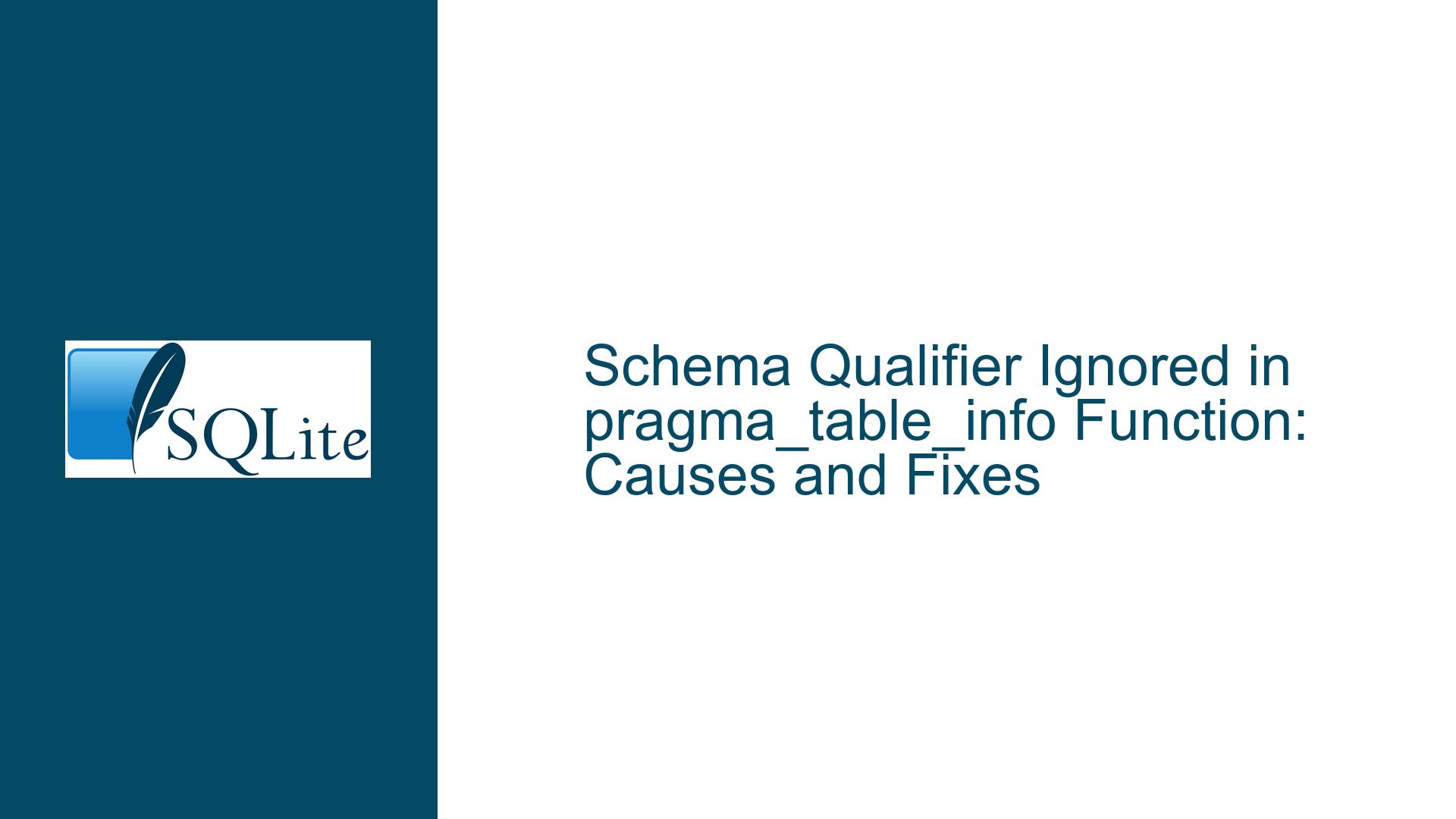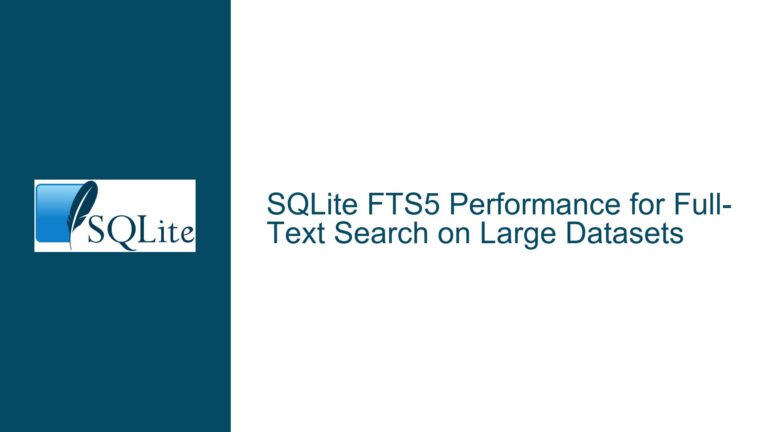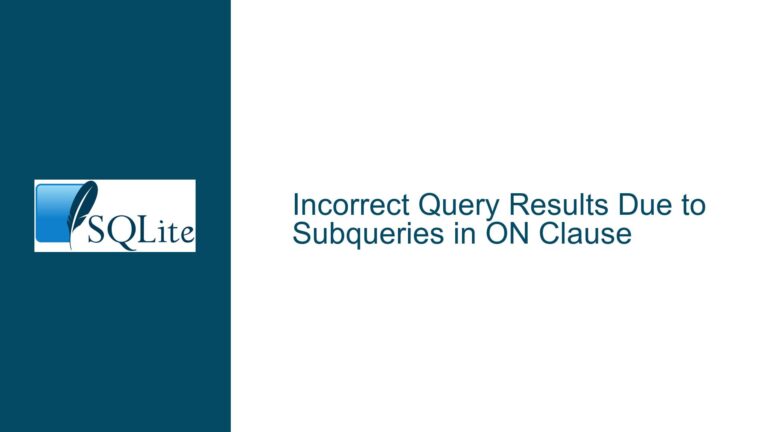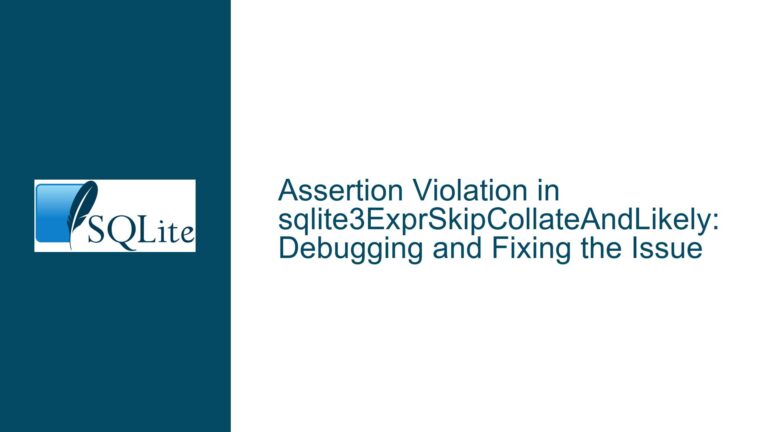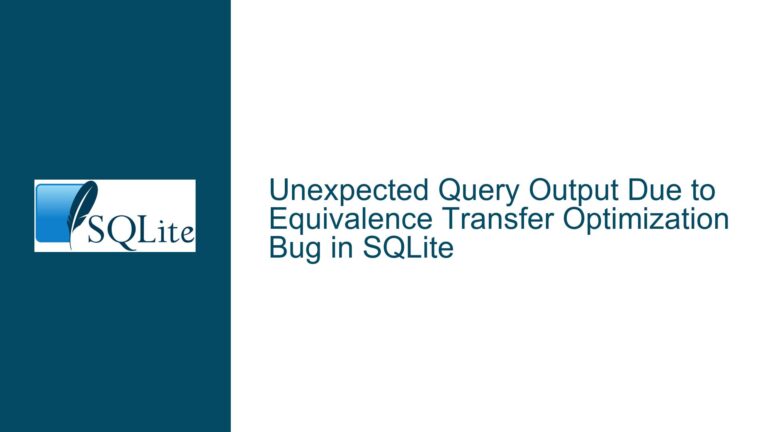Schema Qualifier Ignored in pragma_table_info Function: Causes and Fixes
Understanding Schema Context in PRAGMA Commands vs. Table-Valued Functions
The core issue revolves around discrepancies in schema handling between SQLite’s PRAGMA commands and the newer table-valued functions such as pragma_table_info(). Users familiar with schema-qualified PRAGMA commands may assume that schema qualifiers work identically for both syntax styles. However, the schema context is resolved differently depending on whether the PRAGMA is invoked as a command or as a function.
When executing PRAGMA [schema].table_info('table_name'), the schema qualifier directly specifies the database schema (e.g., main, temp, or an attached database) where the target table resides. This syntax explicitly directs SQLite to query metadata from the specified schema. In contrast, SELECT * FROM [schema].pragma_table_info('table_name') does not respect the schema qualifier in the same way. The function pragma_table_info() requires explicit schema specification via a second parameter, as its schema context is not derived from the qualifier preceding the function name.
This discrepancy arises from fundamental differences in how SQLite resolves schema contexts for commands versus table-valued functions. While PRAGMA commands are tightly integrated with schema qualifiers, table-valued functions like pragma_table_info() rely on parameters to resolve schema contexts. Misunderstanding this distinction leads to unexpected results, such as metadata queries returning information from the main schema instead of the intended schema.
Root Causes of Schema Mismatch in pragma_table_info()
1. Function Invocation vs. PRAGMA Command Resolution
SQLite treats PRAGMA commands and table-valued functions as separate entities with distinct resolution mechanisms. The PRAGMA [schema].table_info command parses the schema qualifier as part of its directive, binding the operation to the specified schema. In contrast, the pragma_table_info() function is resolved as a table-valued function within SQLite’s execution engine. Function resolution in SQLite does not inherently respect schema qualifiers in the same way as object references (e.g., tables or views).
When a user writes [schema].pragma_table_info('table_name'), the schema qualifier is interpreted as a database name for the function’s scope. However, SQLite does not support schema-qualified function calls in this manner. The function pragma_table_info() is always resolved within the schema of the current database connection unless explicitly specified via its parameters.
2. Parameterized Schema Specification in Table-Valued Functions
The pragma_table_info() function accepts an optional second parameter to specify the schema. For example:
SELECT * FROM pragma_table_info('table_name', 'target_schema');
This design requires explicit schema specification, decoupling it from the function’s invocation context. The absence of this parameter defaults to the main schema, regardless of any qualifiers used in the function call. This behavior is intentional but counterintuitive for users accustomed to schema-qualified PRAGMA commands.
3. Historical Evolution of PRAGMA Syntax
SQLite’s PRAGMA commands have existed since early versions, while table-valued functions like pragma_table_info() were introduced later to integrate PRAGMA functionality into SQL’s relational framework. This duality creates a syntactic inconsistency: schema qualifiers work natively with PRAGMA commands but require parameterization in function-based equivalents. Users transitioning from legacy PRAGMA syntax to modern function-based queries often overlook this nuance.
Resolving Schema Context in pragma_table_info()
Step 1: Use the Correct Parameterized Syntax
To retrieve table information from a specific schema, always supply the schema name as the second argument to pragma_table_info():
SELECT * FROM pragma_table_info('table_name', 'target_schema');
Replace target_schema with the actual schema name (e.g., main, temp, or the name of an attached database). This parameterization ensures the function queries the correct schema, overriding the default main schema.
Step 2: Validate Schema Attachment and Accessibility
Ensure the target schema exists and is accessible. For attached databases, verify the attachment alias:
ATTACH DATABASE 'path/to/database.db' AS target_schema;
After attaching, confirm the schema is listed in pragma_database_list():
SELECT * FROM pragma_database_list;
If the schema is not listed, re-attach it or check file permissions.
Step 3: Compare PRAGMA Command and Function Outputs
Run both syntax forms to isolate discrepancies:
-- PRAGMA command with schema qualifier
PRAGMA target_schema.table_info('table_name');
-- Function with schema parameter
SELECT * FROM pragma_table_info('table_name', 'target_schema');
If results differ, inspect the schema parameter for typos or case sensitivity issues. SQLite schema names are case-insensitive but preserve the exact string provided during attachment.
Step 4: Debug Function Context Using Default Schemas
Explicitly test the default schema behavior:
-- Query 'main' schema (default)
SELECT * FROM pragma_table_info('table_name');
-- Equivalent PRAGMA command
PRAGMA main.table_info('table_name');
If these outputs match, the function behaves as expected when the schema is omitted.
Step 5: Handle Complex Schema Hierarchies
For queries involving multiple schemas, use fully parameterized function calls:
SELECT * FROM pragma_table_info('table_name', 'schema1')
UNION ALL
SELECT * FROM pragma_table_info('table_name', 'schema2');
This approach avoids ambiguity and ensures metadata is pulled from the correct schemas.
Step 6: Update Legacy Code to Parameterized Syntax
Refactor existing code that relies on schema qualifiers with pragma_table_info() to use the second parameter. For example:
-- Legacy-style (incorrect)
SELECT * FROM schema1.pragma_table_info('table_name');
-- Updated (correct)
SELECT * FROM pragma_table_info('table_name', 'schema1');
Step 7: Utilize SQLite Metadata Tables as an Alternative
For advanced users, the sqlite_schema table (formerly sqlite_master) provides raw schema data:
SELECT * FROM target_schema.sqlite_schema
WHERE type = 'table' AND name = 'table_name';
While this returns the table’s creation SQL, it lacks the structured columns provided by pragma_table_info().
Step 8: Leverage SQLite’s Function Overloading Mechanism
SQLite allows overloading table-valued functions based on the number of parameters. The pragma_table_info() function can be invoked in two ways:
pragma_table_info('table_name'): Queries themainschema.pragma_table_info('table_name', 'schema'): Queries the specified schema.
Use this overloading to dynamically switch schemas within queries.
Step 9: Audit Cross-Schema Dependencies
When joining metadata across schemas, ensure all function calls parameterize schemas:
SELECT
main_info.name AS main_col,
temp_info.name AS temp_col
FROM
pragma_table_info('table_name', 'main') AS main_info
JOIN pragma_table_info('table_name', 'temp') AS temp_info
ON main_info.name = temp_info.name;
Step 10: Consult SQLite Documentation for Function Signatures
Always reference the official SQLite documentation for function parameters. The pragma_table_info() function is documented as requiring the schema to be specified via its second parameter, independent of the query’s schema context.
By methodically applying these steps, users can resolve schema mismatches and ensure consistent metadata retrieval across both PRAGMA commands and table-valued functions. The key takeaway is to treat schema specification as an explicit parameter in function-based pragmas, rather than relying on qualifiers or invocation context.
